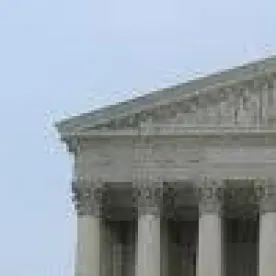On March 24, 2015, the Supreme Court decided Omnicare v. Laborers District Council Construction Industry Pension Fund in a decision written by Justice Kagan, with separate concurrences by Justices Scalia and Thomas.1 The case deals with registration statements required under the Securities Act of 1933 (the Act) for companies that wish to issue securities.2 Such statements must include specified information about the company and the security for sale, and may also include other representations of fact or opinion.3 Section 11 of the Act gives purchasers a right of action against the issuer (or other designated individuals) for omissions or misstatements of material fact.4 The decision focused on the distinction between statements of fact and statements of opinion.
Various pension funds (Funds) that had purchased Omnicare stocks brought suit against Omnicare for providing "materially false" statements in its registration statement.5 The Funds alleged that Omnicare made materially false representations regarding its legal compliance and failed to state material facts necessary to make its representations not misleading.6 The statements in question were as follows:
We believe our contract arrangements with other healthcare providers, our pharmaceutical suppliers and our pharmacy practices are in compliance with applicable federal and state laws.
We believe that our contracts with pharmaceutical manufacturers are legally and economically valid arrangements that bring value to the healthcare system and the patients that we serve.7
Although Omnicare noted after making these statements that the federal government had expressed "significant concerns" about specific Omnicare policies, the Funds alleged that Omnicare did not provide enough information to prevent the above statements from being misleading.8
The District Court granted Omnicare's motion to dismiss, finding that statements about a "company's belief as to its legal compliance" are "soft" information.9 The court held that statements of this nature are actionable only if the statement maker "knew they were untrue at the time."10 Since the complaint did not include an accusation that the company's officers knew their policies were violating the law, the allegations did not satisfy the requirements for a cause of action.11 The Sixth Circuit reversed, holding that even though the statements of opinion were not hard facts, the Funds had to allege only that Omnicare's beliefs were "objectively false," not necessarily that Omnicare disbelieved its own statements.12
The Supreme Court vacated the decision of the Court of Appeals and focused its decision on the application of Section 11 to statements of opinion.13 Using a commonsense rationale, the Court clarified that opinions affirm only the fact that the speaker holds the stated belief.14 The Court further explained that "the two sentences to which the Funds object are pure statements of opinion and the Funds do not contest that Omnicare’s opinion was honestly held."15 Applying the Section 11 standard of liability, the Court held that "a sincere statement of pure opinion is not an 'untrue statement of material fact,' regardless of whether an investor can ultimately prove the belief wrong."16
The Court further addressed whether Omnicare's statements were misleading. The Court determined that "whether a statement is 'misleading' depends on the perspective of a reasonable investor."17 A reasonable investor would not equate an opinion with a guarantee of fact.18 However, the Court noted that it would be reasonable for an investor to assume that a statement of opinion is consistent "with the information in the [statement] issuer's possession at the time."19 Therefore, the Court held that, "if a registration statement omits material facts about the issuer's inquiry into or knowledge concerning a statement of opinion, and if those facts conflict with what a reasonable investor would take from the statement itself, then § 11's omissions clause creates liability."20 The Court remanded the case for further proceedings to determine whether "the alleged omission rendered Omnicare’s legal compliance opinions misleading."21
In his concurrence, Justice Scalia disagreed with the objective test the majority proposed for determining reasonableness of opinions.22 He expressed concern that this test was "inconsistent with common law and common institutions about statements of opinion" and that it may invite "roundabout attacks upon expressions of opinion."23 Justice Thomas also concurred in the judgment, but he believed it was improper for the Court to rule on the issue of when omissions may make a statement of opinion misleading.24
The Omnicare decision provides long-awaited resolution to a circuit split on the scope of liability under Section 11 for false statements of opinion. In establishing that opinions which turn out to be wrong are not necessarily materially false statements, Omnicare provides a higher degree of protection to issuers when their statements are framed as opinions. Additionally, because the Omnicare test involves examining a reasonable investor's understanding, there may be significant uncertainty going forward with respect to how lower courts will assess whether an opinion is misleading.
1 135 S. Ct. 1318 (2015).
2Id. at 1323.
3Id.
4Id.
5Id.
6Id.
7Id. at 1323.
8Id. at 1324.
9Id.
10Id.
11Id.
12Id.
13 Id. at 1325.
14Id. at 1326.
15Id. at 1327.
16Id.
17Id.
18 Id. at 1328.
19Id. at 1329.
20Id. (internal citations omitted).
21Id. at 1333.
22Id. at 1336 (Scalia, J., concurring).
23Id.
24 Id. at 1337 (Thomas, J., concurring).


 />i
/>i

